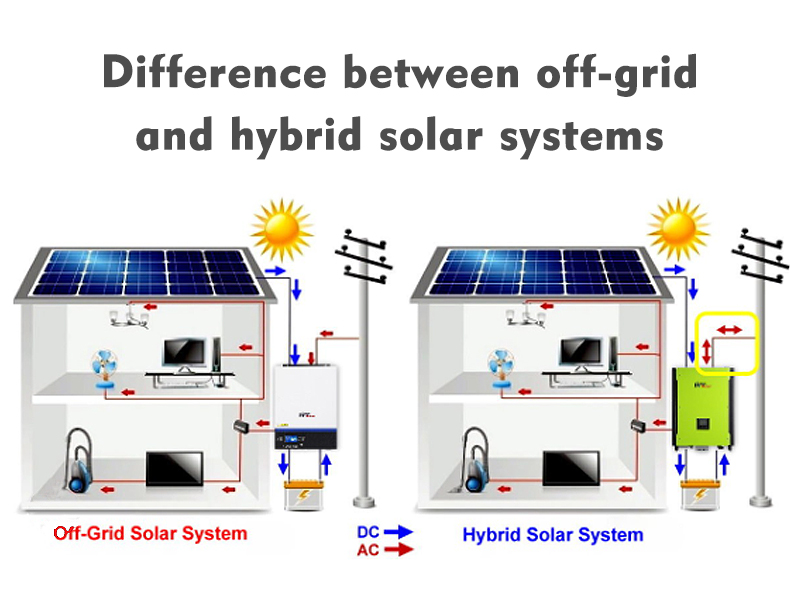Off-grid solar systems and hybrid solar systems are two popular options for harnessing the power of the sun. Both systems have their own unique features and benefits, and understanding the differences between the two can help you make an informed decision when choosing a solar solution that fits your needs.
Off-grid solar systems are designed to operate independently of the main grid. These systems are typically used in remote areas where grid access is limited or non-existent. Off-grid solar systems typically consist of solar panels, charge controllers, battery banks, and inverters. Solar panels collect sunlight and convert it into electricity, which is then stored in battery banks for use when sunlight is low or at night. An inverter converts stored DC power into AC power, which can be used to power appliances and equipment.
One of the main advantages of off-grid solar systems is the ability to provide power in remote areas where there is no grid. This makes them an ideal solution for off-grid cabins, RVs, boats, and other remote applications. Off-grid solar systems also provide energy independence, allowing users to generate their own electricity and reduce dependence on the grid. Additionally, off-grid systems can provide backup power during grid outages, ensuring critical appliances and equipment remain operational.
Hybrid solar systems, on the other hand, are designed to work in conjunction with the main grid. These systems combine solar energy with grid power, allowing users to benefit from both sources of electricity. Hybrid solar systems typically include solar panels, a grid-tied inverter, and a battery storage system. Solar panels use sunlight to generate electricity, which can be used to power a home or business. Any excess power generated by solar panels can be fed back into the grid, allowing users to receive credits or compensation for the remaining power.
One of the main advantages of hybrid solar systems is their ability to provide a reliable and stable supply of electricity. By integrating with the grid, hybrid systems can draw on grid power when solar energy is insufficient, ensuring continuous power supply. Additionally, hybrid systems can take advantage of net metering programs, allowing users to offset their electricity bills by exporting excess solar energy to the grid. This can result in significant cost savings and reduced reliance on grid power.
When comparing off-grid solar systems to hybrid solar systems, there are several key differences to consider. The main difference is their connection to the main grid. Off-grid systems operate independently and are not connected to the grid, while hybrid systems are designed to work in conjunction with the grid. This fundamental difference has implications for the functionality and capabilities of each system.
Off-grid solar systems are ideal for applications where grid power is unavailable or impractical. These systems provide self-sufficient power, making them ideal for off-grid living, remote locations, and emergency backup power. However, off-grid systems require careful planning and sizing to ensure they can meet users’ energy needs without relying on grid power.
In contrast, hybrid solar systems offer the flexibility of solar and grid power, providing a reliable and versatile energy solution. By utilizing the grid as a backup power source, hybrid systems ensure a stable power supply, even during periods of low sunlight. Additionally, the ability to export surplus solar energy to the grid can provide financial benefits to users through net metering programs.
Another important consideration is the role of battery storage in each system. Off-grid solar systems rely on battery storage to store excess solar energy for use when sunlight is limited. The battery pack is a key component, providing energy storage and enabling off-grid operation. In contrast, hybrid solar systems may also include battery storage, but when solar energy is insufficient, the grid serves as an alternative power source, reducing reliance on batteries.
In summary, off-grid solar systems and hybrid solar systems offer unique advantages and capabilities. Off-grid systems offer energy independence, ideal for remote locations, while hybrid systems offer the flexibility of solar and grid power. Understanding the differences between these two solar solutions can help individuals and businesses make informed decisions when choosing the system that best suits their energy needs. Whether living off the grid, having backup power, or maximizing solar energy savings, off-grid and hybrid solar systems are uniquely positioned to meet a variety of energy needs.
Welcome to contact off-grid solar system manufacturer Radiance to get a quote, we will provide you with the most suitable price, factory direct sales.
Post time: Apr-17-2024


